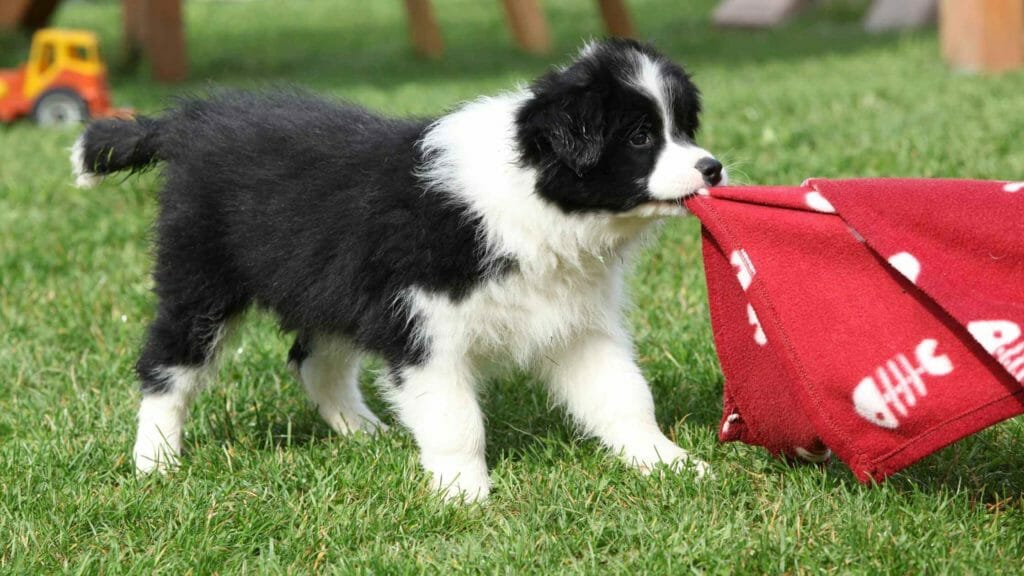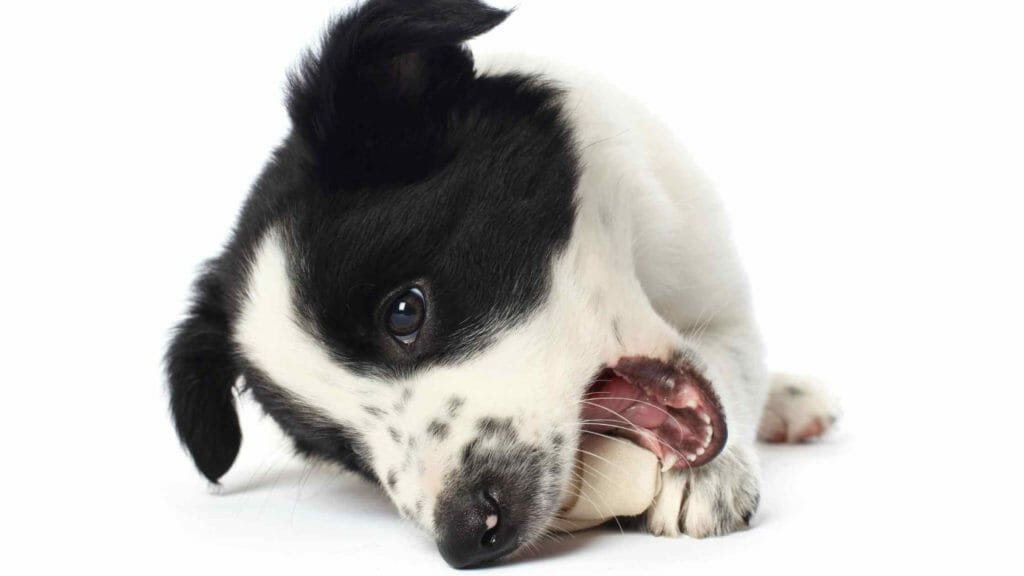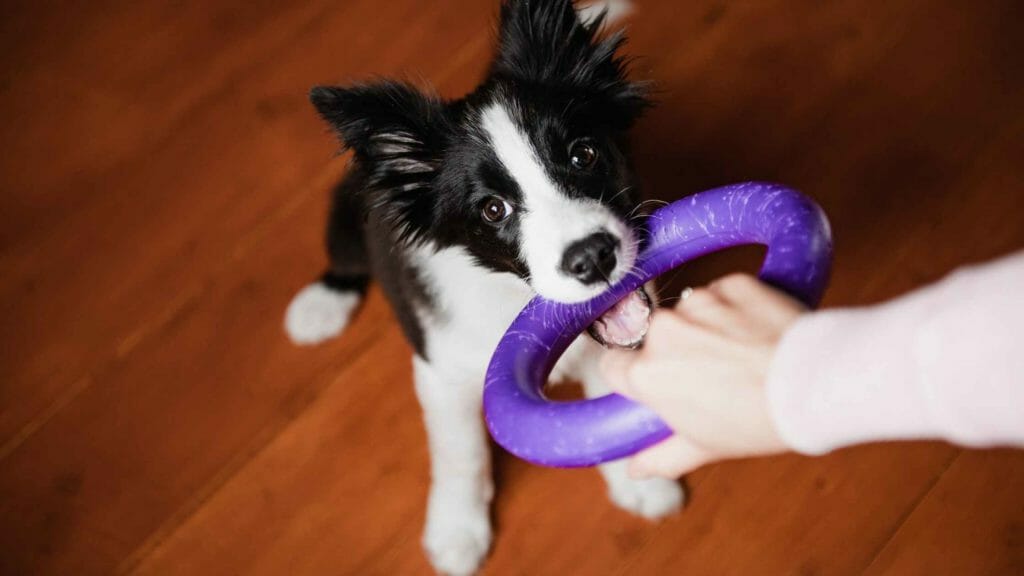
Border collies are known for their intelligence, loyalty, and their herding instinct. If you have a border collie, training them not to bite can be difficult.
This is because they are bred specifically to herd livestock and catch sheep or other animals that might try to run away from the herder. This makes training them not to bite a little more difficult than training other breeds of dogs.
For this breed of dog not to bite, there are some training tips and tricks that you can follow. No matter what stage of life your Border Collie is in, there are steps that can be taken to teach them not to bite and make sure they never do again!
Why do Border Collie puppies bite and chew? (Ankles, Legs, and Arms)
Border Collie puppies might bite because they are teething, just like human babies. They want to explore the world around them with their mouths, and they may see your hands or legs as an object that can be chewed on!
Some BC puppies start chewing out of boredom – there is nothing else to do, so they find something to keep themselves occupied.
If you have a BC puppy who is chewing for no reason, then maybe consider getting him or her a toy that can be chewed on or occupy your dog’s time with a walk.
If your BC puppy is biting you, it may be out of excitement. Of course, like any other dog, BC’s can also bite out of fear or anxiety. If this is the case, you need to spend time socializing your dog and make sure they feel safe in all situations before you can proceed with training them not to bite.
Unlimited claims, No credit checks, No upper age limit & Multiple pet discounts
Compare the best rates on pet insurance
When do Border Collie puppies stop biting?
As a dog owner, you are not alone in the fight against your Border Collie puppy biting!
Most BC’s will grow out of this behavior by the time they reach maturity. However, if you have noticed that your pup is still biting at an older age, it may be due to other factors.
If this is the case, you should consult your vet to make sure there isn’t something medically wrong that could be causing your dog to chew and bite.
If it’s not due to medical issues, then some training steps can be taken to teach your BC pup not to bite.
Border Collie puppy biting other dogs and people
If your Border Collie puppy is biting other dogs or people, then you need to make sure that their socialization is up-to-par. This means they must be comfortable and familiar with other people, children, and pets before you can begin training them not to bite other dogs or people.
The first step of this training process is to watch your BC pup’s body language at all times. When they are around other dogs or people, make note of how they act – do their ears stand up? Do they wag their tail?
Keep track of what the other dog is doing as well. You don’t want to punish your pup or distract him or her if it’s not necessary! This will only cause them to be confused and not understand why you are upset.
Suppose your BC pup is barking, growling, snarling, or otherwise showing aggression towards the other dog. In that case, you must immediately separate them from one another.
Border Collie Puppy Aggressive Biting Behaviour
A puppy trying to establish dominance is another reason that your BC pup may be biting and chewing on everything in sight. Although it can be frustrating, you need to realize that this is a phase and one that will eventually pass.
Aggressive biting behavior can be easily prevented by teaching your BC early on that they will not get anything they want when they bite. If you give in to this behavior, then your pup will think that biting is a way to get what he or she wants!
You can do this by yelping and immediately leaving the room whenever your pup bites you. Eventually, they will get the point that this behavior does not work and will stop immediately.
You should also never play tug-of-war games with your pup if they are biting you because it can increase their aggressive biting behavior.
Signs Your Puppy is Aggressive
Some signs your BC puppy is aggressive include:
- Biting for no reason;
- Lunging or snapping when people try to pet them;
- Ears that are pinned back;
- Growling when you approach;
If you see any of these signs, then it means you need to remove the dog from the situation and assess what is going on. Is something causing them fear or anxiety? Are they stressed by something else?
Stop Aggressive Puppy Biting
To stop aggressive puppy biting, you should:
- Socialize your pup with other dogs and people as young as possible. They are more likely to be tolerant of differences if they are exposed to them early on;
- Make sure they have many opportunities for exercise so that they tire themselves out both physically and mentally;
- Avoid playing games like tug-of-war, wrestling, etc.;
- Do not use your hands to redirect their biting. Instead, you should clap loudly or yelp when they bite so that they understand that this behavior is unacceptable;
- Reward proper behavior with treats or praise to show them that they are doing the right things.
Your Border Collie pup should stop aggressive biting within a few weeks. If it doesn’t stop, then you should consult a professional dog trainer.

Training a Border Collie Puppy Not to Bite (9 Steps)
The training process could take anywhere from one day up until a few months, depending on what type of training your pup will respond best to!
BC’s are smart and intelligent dogs, but they can also be stubborn, so this may take some time and effort!
So if you want your border collie puppy not to bite, here’s how it’s done.
1 – Stop Bites While Playing
Border Collies also bite when they are playing with other dogs. They might see a person’s hand as fair game during a game of tug-of-war or when giving high fives.
The key is to make sure they understand playtime is a time for humans and dogs to bond and have fun.
As soon as the pup goes for a bite, a firm “No!” or “Ow!” should be enough to get them to stop. This needs to be done every single time they do it until they learn.
2 – Use Your Authority Voice
Your voice is a very powerful tool when it comes to training your Border Collie.
Your pup will learn their boundaries quickly if you make sure they understand the difference between “ouch” and “play.” The word play can come in many forms, such as running, playing fetch, tug-of-war, and more.
If they get too rough and you let out a yelp, make sure they stop. If that doesn’t work, give them a stern “no.”
To summarize: Make sure to use your authority voice when playing with your BC pup, and you should be able to train them not to bite as easily as possible!
3 – Stop with the Aggressive Games
Aggressive games like wrestling and tug-of-war must be avoided.
These games can encourage your pup to play too rough, and it may lead to biting as a result.
It is best to avoid these types of games altogether until you feel like your Border Collie has better control over their own behaviors and they know the difference between good and bad behavior.
4 – Consistency is key
You need to be consistent in your training.
If you let them get away with one form of aggressive behavior, they are likely to assume that the behavior is okay in all other situations.
So if they bite too hard while playing tug-of-war, use your stern voice and show them what unacceptable play looks like. By doing this consistently, you should be able to train them not to bite.
5 – Exercise and Socialization are important
Exercise and socialization is the most important thing you can do for your Border Collie.
You should always make sure that they get out to run around and play with other dogs at least once a day. This will keep them fit, healthy and happy, and teach them that the world is not an aggressive place!
If they become too tired or stressed, their behavior will become much worse.
Keep in mind not to push them or force them into something they are uncomfortable with. Border Collies are extremely sensitive dogs that can sense your emotions!
6 – Area guarding
Guarding behaviors can also occur when they see something as theirs. They may even growl and snap at anyone who comes near them to protect their toy, food bowl, or your favorite pair of shoes!
This behavior is very common early on, but it can be avoided or fixed through consistent training.
You can try to take away their favorite item they are guarding and then give it back to them, asking for a trade!
Make sure you offer the dog an equally good treat like a piece of meat or another toy in return. If they don’t let go of their first object, keep trying until they do. Then explain to them that it is a trade.
If the behavior gets worse, you can teach your BC to “give” or “drop it” with a series of rewards and praise. Make sure to take their favorite item away from them again if they don’t respond well!
You also need to make sure they understand who is in charge and establish yourself as the pack leader. If they don’t understand who is in charge, they will become very stubborn and more likely to guard their items.
This will ensure that your pup knows you are the leader of the house, and this is their place to follow.
Making your dog look up to you makes it easier for them not to bite, especially when around other animals or people.
7 – Establish Boundaries
Make sure you don’t let your Border Collie get away with anything they ask for, such as food, toys, or affection.
When you give them a treat every time, make sure you tell them “no” first and then do it. This way, they’ll learn that they first have to do something for you before you give them what they want.
With affection, if your Border Collie wants attention or comes into your space, ignore them until they calm down and then ask them to sit quietly. Only then can they come onto your lap, sleep by your feet or get their belly rubbed!
8 – Stop defensive biting
Defensive biting is when your pup snaps at you to help protect themselves or their space. This is probably one of the first behaviors I would recommend against showing them.
This behavior can lead to other unwanted behaviors because if they snap at you, what makes you think they won’t snap at other people?
By avoiding this behavior early on, you are preventing them from practicing it. If they act defensive, then act dominant and show them that you’re not scared of them!
Use your authority voice and make him understand who is in charge. Don’t ever let your Border Collie get away with this behavior, even if it only happens once every now and then. It can quickly turn into aggression or fear-biting if allowed to continue.
9 – Biting and chewing caused by teething
Teething can be a nightmare for dog owners. Your pup will want to chew on everything!
Even the softest toys will not be so soft for your pup’s mouth, but you can use this opportunity to teach them how to behave when they are chewing on their toy.
First of all, keep in mind that teething is a natural process, and just like with any other dog breed, it will pass. Make sure you have two or three toys ready to keep your pup busy – this way, they don’t get bored and find something more fun to do.
You also need to be very patient as the pup will still try out boundaries and learn their place in the pack, which can lead to some minor nipping and biting sessions.
Be sure that you only punish the behavior once your pup has finished chewing on their toy. This way, you make sure you are not rewarding the behavior by giving them attention.
Teaching your pup to drop their toys is also a very important step in moving forward! You can do this by playing with your pup and then putting it out of reach while telling them “drop”. Then praise them when they do.
Do this enough times, and your pup will begin to realize that dropping the toy is what gets them rewarded!
This won’t be too much of a problem when they get older because you can train them not to bite or otherwise get them interested in chewing something else. But during the teething stage, it can be very difficult to stop your Border Collie from biting.

Things you can buy to help prevent your Border Collie biting and nipping
There are toys you can buy that can be filled with treats and will keep your pup entertained for hours. These are the perfect thing to have on hand when you are too busy to play, or they are left at home alone.
The Kong dog toys are also pretty good at getting a Border Collie to chew on what’s intended for them without causing damage around the house! They will also help with your pup’s teeth and gums.
Another thing you can try is a bitter spray that you can spray on belongings, furniture, or even yourself. This will help your pup know what not to bite or at least associate it with a bad taste!
All of these things have helped me and my pup immensely, so I hope they help you as well!
In Conclusion
The main thing to remember when training your Border Collie not to bite is to be patient with them!
They are smart, but they can’t read minds, so they may not understand what you’re asking of them.
Make sure to always use the same words for each command and be consistent with whatever you do.
Border Collies are very eager to please their owners, so as long as you show them that you are a good leader, they will follow your commands with no hesitation!
This is a simple nine-step process to help your Border Collie pup understand the difference between “ouch” and “play”.
The sooner you start training them not to bite, the easier it will be later on.
Unlimited claims, No credit checks, No upper age limit & Multiple pet discounts
